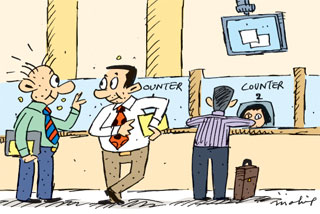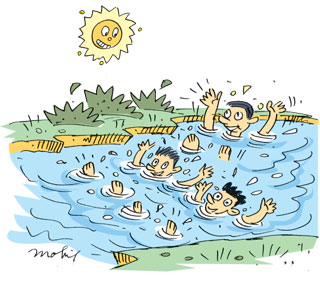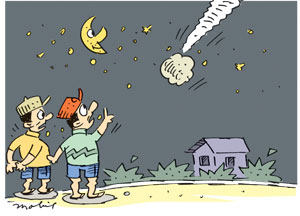|
 by
R. S. Karunaratne by
R. S. Karunaratne
Float: Many shades of meaning
Most English words have different shades of meaning. Let's have a
look at 'float' in different contexts.
'Float' is a verb that means 'not sink.'
If you throw an empty plastic bottle into a tank, it will float.
|

The Government has decided to float the rupee. |
You can float on the Dead Sea.
'Float' can be used in the sense of 'move' easily along the surface
of a liquid or through the air.
The children enjoyed themselves floating down the Mahaweli River.
We watched dark clouds floating across the sky.
The literary meaning of 'float' is 'move smoothly and attractively.'
Khema floated across the stage, like a ballet dancer.
'Float' can mean 'move around doing nothing.'
Some unemployed people float around looking for jobs.
'Float' is used in the sense of 'suggesting a plan.'
Jaya floats the idea that we should form a Literary Club.
In economics 'float' means 'to allow the value of money to change
according to the value of other currencies.'
The Government has decided to float the rupee.
'Floating on air' is an idiom meaning 'to be very happy.'
When Prema passed the GCE A/L examination she was floating on air.
'Float' somebody's boat' is an informal idiom that means 'to do
something you like.'
|

The children enjoyed themselves floating down the Mahaweli
River. |
Writing poems does not really float my boat.
'Floating around' is a phrasal verb that means 'something is not far
away but you cannot find it.'
I can't find my pen, but it must be floating around somewhere.
Sometimes, ideas or rumours float around.
What's the latest rumour floating around the country?
'Floating' is an adjective that means 'not fixed.'
Colombo has a large floating population.
(= A lot of people come to Colombo for work but they do not reside
there.)
The bank offered me a loan with a floating interest rate. (= The
interest can vary from time to time).
There are 'floating voters' who do not vote for the same political
party. All political parties try to lure 'floating voters' by giving
various promises.

If you wish to speak fluently or write elegantly, you will have to
know more words. For beginners many words appear to be new. They have to
know them well to be good speakers and writers. Here is a quiz on some
selected English words. After doing the quiz check your answers with the
key.
1. The fighting in Afghanistan shows no sign of abatement.
(a) reduction
(b) escalation
(c) settlement
2. He adjured his religion for material benefits.
(a) embraced
(b) renounced
(c) used
3. She abominates cruelty to animals.
(a) ignores
(b) loves
(c) hates
4. The guest absconded with Rs. 100,000 of the host's money.
(a) appeared
(b) escaped
(c) returned
5. Mahathma Gandhi led an abstemious life.
(a) eating simple food in moderation
(b) luxurious
(c) poor
6. The teacher asked me not to write such abstruse philosophical
essays.
(a) incorrect
(b) free flowing
(c) difficult to understand
7. His parents' marriage ended in an acrimonious divorce.
(a) full of anger
(b) sudden
(c) delayed
8. The powerful politician was asked to adjudicate on the land
dispute.
(a) terminate
(b) act as judge
(c) punish
9. My boss talks ad nauseam about how clever his children are.
(a) at times
(b) non-stop
(c) to the point of disgust
10. Soon he became adroit at dealing with difficult people.
(a) excellent
(b) skilful
(c) tired
11. The reviewer found himself irritated by the adulatory tone of the
biography.
(a) Showing too much admiration
(b) dull
(c) high-pitched
12. The school library was set up under the aegis of the Library
Services Board.
(a) rules
(b) direct control
(c) with the support
13. The new bank building has no aesthetic appeal.
(a) relating to architecture
(b) relating to the enjoyment of beauty
(c) relating to local standards
14. "I don't care," she said with an affectation of nonchalance.
(a) arrogance
(b) carelessness
(c) behaviour that is not sincere
15. Anula seems to have a natural affinity for water.
(a) liking
(b) strong dislike
(c) tendency
************
[Key] 1.(a), 2.(b), 3.(c), 4. (b), 5.(a), 6(c), 7.(a), 8.(b), 9.(c),
10.(b), 11.(a), 12,.(c), 13.(b), 14.(c), 15.(a)
************
Starters :
Past
continuous tense
The past continuous tense is formed by the past tense of the verb 'to
be' + the present participle.
Affirmative
I was reading (First person singular)
You were reading (Second person
|

As we were looking at the night sky we saw something falling
from it. |
singular)
He was reading (Third person singular)
We were reading (First person plural)
You were reading (Second person plural)
They were reading (Third person plural)
Negative
I was not reading (First person singular)
You were not reading (Second
person singular)
He was not reading (Third person
singular)
We were not reading (First person
plural)
You were not reading (Second
person plural)
They were not reading (Third
person plural)
Interrogative
Was I reading? (First person singular)
Were you reading? (Second person
singular)
Was he reading? (Third person singular)
Were we reading? (First person plural)
Were you reading? (Second person
plural)
Were they reading? (Third person
plural)
Contractions
Was not : wasn't
Were not: weren't
The past continuous tense is used to indicate past actions which
continued for some time.
The wind was blowing.
The kite was flying.
We were dancing.
The students were writing.
He was teaching.
In the above situations no time limit is mentioned. Therefore, they
can indicate gradual development.
We can use the past continuous tense with a point in time to express
an action which began before that time and probably continued after it.
When I met Raju he was having
breakfast.
As we were looking at the night sky
we saw something falling from it.
When I returned home Sam was
talking on the telephone.
We use the past continuous tense
in descriptions.
Some boys were dancing on the floor and a musician was playing the
guitar.
The past continuous tense can be used to indicate a more casual and
less deliberate action.
I saw Leela was talking to my daughter the other day.
Sometimes, the past continuous tense is more polite than the simple
past tense.
What did you do before you came here?
What were you doing before you came here? (This is more polite than
the above)
|

